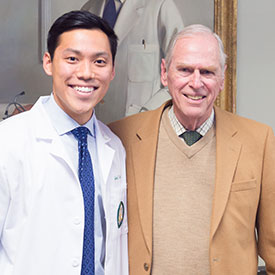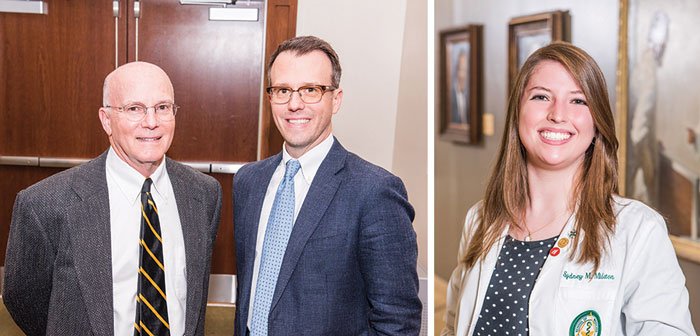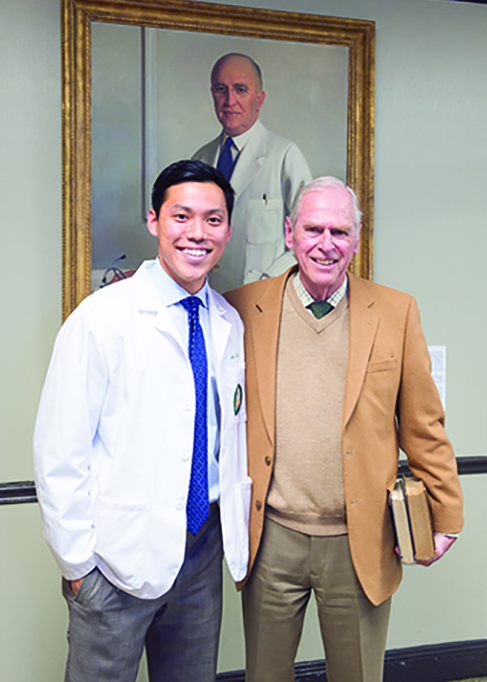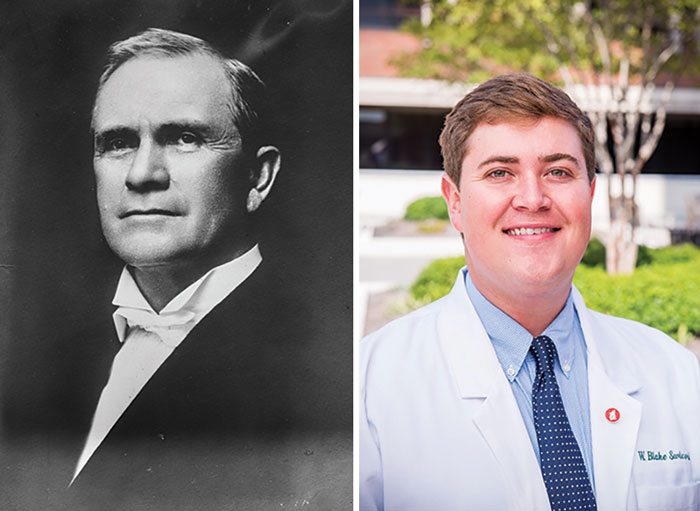 Meet scholarship recipients and the donors who are fueling their dreams, like John Ahn and Jamie French.The School of Medicine is fortunate to have many scholarship supporters whose impact on the lives of our students and their future patients, as well as the school’s mission to train skilled and compassionate physicians, is immeasurable. Thanks to their generosity, the school distributed more than $2.9 million in scholarship dollars to 171 students for the 2017/2018 academic year—meaning almost a quarter of the medical student body received a scholarship. In the following pages, you’ll meet a few of our outstanding scholarship recipients and the philanthropic supporters whose generosity is helping make their dreams of a career in medicine a reality.
Meet scholarship recipients and the donors who are fueling their dreams, like John Ahn and Jamie French.The School of Medicine is fortunate to have many scholarship supporters whose impact on the lives of our students and their future patients, as well as the school’s mission to train skilled and compassionate physicians, is immeasurable. Thanks to their generosity, the school distributed more than $2.9 million in scholarship dollars to 171 students for the 2017/2018 academic year—meaning almost a quarter of the medical student body received a scholarship. In the following pages, you’ll meet a few of our outstanding scholarship recipients and the philanthropic supporters whose generosity is helping make their dreams of a career in medicine a reality.
Visionary Support
Stephen Kelly, M.D., a prominent Birmingham ophthalmologist and former chair of the UAB Department of Ophthalmology, lived a remarkable life of overcoming hardship, serving his country in wartime, and taking a chance on working at a fledgling medical center. When he died in 1986, his family wanted to create a memorial to honor his inspiring legacy.
Kelly was strongly committed to medical education, and his widow, Patricia White Kelly, was a longtime member of the Philanthropic Educational Organization (PEO) Sisterhood. The family decided it would be fitting to establish the Stephen J. Kelly Memorial Scholarship Fund for medical students at UAB.
Born in 1925, Kelly grew up an orphan in San Francisco but thrived at a prep school that gave him a scholarship. He served as an ophthalmologist in the Air Force during the Korean War before coming to UAB.
“My dad became the Department of Ophthalmology chair in 1955 when he was 30, very young for a chairman of a department,” says his son, Christopher Kelly, M.D.
 Left to right: Christopher Kelly and his son Stephen are continuing the tradition of excellence in ophthalmology established by their father/grandfather, Stephen Kelly; Sydney Middleton is the recipient of a scholarship that honors Kelly’s life and career (photo by Nik Layman)Kelly also established a private practice on Birmingham’s Southside, where Christopher and his own son, named Stephen Kelly after his grandfather, now practice ophthalmology together. Both are School of Medicine alumni, and Christopher served as chief of staff at UAB Callahan Eye Hospital from 2012-2017.
Left to right: Christopher Kelly and his son Stephen are continuing the tradition of excellence in ophthalmology established by their father/grandfather, Stephen Kelly; Sydney Middleton is the recipient of a scholarship that honors Kelly’s life and career (photo by Nik Layman)Kelly also established a private practice on Birmingham’s Southside, where Christopher and his own son, named Stephen Kelly after his grandfather, now practice ophthalmology together. Both are School of Medicine alumni, and Christopher served as chief of staff at UAB Callahan Eye Hospital from 2012-2017.
Stephen says his grandfather’s dedication to UAB was evident. “Teaching and helping run a department along with seeing patients in private practice required significant time and effort,” he says. “He considered it a high priority.”
Christopher points out that while the idea for the scholarship came quickly, the family did not have the ability to make their goal an overnight reality. Instead, Patricia, their children, extended family, and close friends made regular contributions until, about 10 years later, the fund was large enough to begin making yearly awards.
“When you think of a scholarship fund, you think of an old family with tons of money,” he says. “You don’t necessarily have to have that. If you do it over time, you can accumulate enough to make a significant difference.”
Sydney Middleton, a third-year medical student, is one of the students who have benefitted from the legacy the Kelly family created. A Pinson native who attended Birmingham-Southern College, Middleton became interested in medicine when she was diagnosed with Type 1 diabetes at 14. “I was a patient at Children’s of Alabama, and my experience inspired me to want to help heal illness and help people manage disease,” she says.
Since entering the School of Medicine with assistance from the Kelly scholarship and the Henry Harland Hoffman Endowed Medical Scholarship, Middleton has looked for opportunities to help others while she earns her degree. She served this past year as an executive officer for Equal Access Birmingham, the School of Medicine’s student-run free clinic for the medically underserved. “That was a lot of work while completing my second year, but I really enjoyed doing it because I was helping individuals in the community who can’t otherwise get care,” she says.
Middleton says she feels a strong draw to the field that was her initial introduction to medicine: pediatric endocrinology. “The first time I, as a medical student, talked to kids who have diabetes and understood firsthand what they’re going through and how to help them manage it was incredible,” she says.
Middleton is grateful to the Kellys for helping make her dreams possible. “I hope the family realizes how much they impact the students they are helping,” she says, adding that one day she’d love to create a scholarship fund. “It’s powerful, and I think very needed in this day and age when students have lots of potential but sometimes need a little help to go as far as they can.” – Rosalind Fournier
Legacy of Excellence
 John Ahn and Jamie French stand before a portrait of Dr. James McLester, French's grandfather, for whom the McLester Endowed Medical Scholarship is named.When he was 6, John Ahn’s family moved from South Korea to Huntsville. Now the 24-year-old Ahn is a second-year medical student at the School of Medicine leaning toward either pediatric oncology or otolaryngology. He says receiving the McLester Endowed Medical Scholarship, along with other scholarship support from the school, is helping him realize his dream.
John Ahn and Jamie French stand before a portrait of Dr. James McLester, French's grandfather, for whom the McLester Endowed Medical Scholarship is named.When he was 6, John Ahn’s family moved from South Korea to Huntsville. Now the 24-year-old Ahn is a second-year medical student at the School of Medicine leaning toward either pediatric oncology or otolaryngology. He says receiving the McLester Endowed Medical Scholarship, along with other scholarship support from the school, is helping him realize his dream.
“Coming from an immigrant family and an immigrant background, it’s a tremendous blessing to live in the U.S.,” says Ahn, who is one of six students receiving the scholarship in the 2017-2018 school year. “This scholarship was a huge help financially, and knowing that someone believes in me as a future physician means the world to me.”
The McLester Endowed Medical Scholarship is named after James Somerville McLester, M.D., the first chair of medicine at what would become UAB. The scholarship is the brainchild of Birmingham businessman Jamie French and his wife Mary Dunn French. Jamie French, whose full name is James Somerville McLester French, is a grandson of McLester, along with his brother Billy.
“We consider ourselves fortunate to be descended from him, and we recognize that he was an eminent physician in his career who made a significant contribution to medicine at UAB,” French says.
Born in 1877 in Tuscaloosa, McLester was the chief of medicine at the School of Medicine when it was in Tuscaloosa, and the first chair and professor of medicine at the Medical College of Alabama when it opened in Birmingham in 1945. Overall, he served at the medical school from 1921-1949 and was a key figure during its transition from a two-year, pre-clinical medical school to a four-year medical school.
McLester was a pioneer in nutrition studies and wrote an influential textbook, Nutrition and Diet in Health and Disease, first published in 1927. He helped put the then-recently discovered vitamins nicotinic acid, thiamin, ascorbic acid, and folic acid to use in the treatment and prevention of major deficiency diseases, including pellagra, beriberi, and scurvy. He was the chair of the Council on Food and Nutrition of the American Medical Association (AMA) and served as president of the AMA in 1935. “That was quite an achievement in the 1930s for a gentleman from Alabama,” French says.
The School of Medicine unveiled a portrait of McLester by artist Jay Wesley Jacobs in the main lobby of the UAB Community Health Services Building on Jan. 18. The event was attended by the Frenches as well as more than 20 family members. The building stands on the same site where McLester’s primary care-focused practice once stood. The portrait was commissioned in the late 1940s by the AMA to acknowledge McLester’s significant contributions to medicine.
French says he hopes students who encounter his grandfather’s portrait will learn more about him and try to emulate the high standards McLester set in his medical practice. “Dr. McLester lived an exemplary life,” he says. “It is beneficial for the students who receive the scholarships to learn a little bit more about him, because it sets a high goal for them in their future practices.”
The genesis of the McLester Endowed Medical Scholarship came about 15 years ago when French says School of Medicine leaders approached him with the idea. “That was attractive to us as a way to honor my grandfather’s legacy, so we launched the program,” he says.
After that meeting, he and his wife made the initial gift to establish the scholarship. Over time, they made additional gifts and convinced more than a dozen other family members to contribute to the scholarship as well.
“The education of a single medical student can touch hundreds if not thousands of lives,” he says. “We enjoy supporting gifts that can have that multiplier effect, so this has been a good project for the entire family.”
Jamie French says he sees the endowed scholarship as a way for his family to help train future physicians, and he hopes to keep in touch with the recipients. “They seem to appreciate that someone or a group of people with no relationship to them thinks enough of their future medical careers to help them with their education,” he says. – Ryan Broussard
Living History
 Braxton Bragg “B.B.” Comer served as the 33rd governor of Alabama from 1907-1911 and as a U.S. senator in 1920. The Comer Foundation Medical Scholarship is awarded to one student per class per year, including first-year medical student Blake Swicord (photo by Nik Layman).William “Blake” Swicord, a first-year medical student, has a classic “first in his family to go to college” story. But in his case, he’s also one of very few people in his entire hometown of Eclectic, Alabama—population approximately 1,000—to graduate college. “It’s a wonderful place to grow up, but it’s hard to dream big sometimes when you’re in a small town,” Swicord says.
Braxton Bragg “B.B.” Comer served as the 33rd governor of Alabama from 1907-1911 and as a U.S. senator in 1920. The Comer Foundation Medical Scholarship is awarded to one student per class per year, including first-year medical student Blake Swicord (photo by Nik Layman).William “Blake” Swicord, a first-year medical student, has a classic “first in his family to go to college” story. But in his case, he’s also one of very few people in his entire hometown of Eclectic, Alabama—population approximately 1,000—to graduate college. “It’s a wonderful place to grow up, but it’s hard to dream big sometimes when you’re in a small town,” Swicord says.
The oldest of five children born when his parents were just out of high school, Swicord had early dreams of pursuing a career in medicine. He traces that back to a single event in his life: his 13th birthday when his father was badly injured in a motorcycle accident. “That had a huge impact on me,” he says. “My dad was like my superhero, and I was terrified.” But he also learned from the experience. “I remember the doctors giving me this feeling of, ‘Anything that can go right will go right if we can help it,’” he says. “That comforted me a lot. After seeing my dad get better I thought, ‘One day, I want to be able to fill that role of helping people and getting them through tragedy.’
Swicord attended Troy University, where he shadowed local physicians whenever he could, testing the waters for his hoped-for career in medicine. When Swicord was accepted at the UAB School of Medicine through the early decision program, he felt he’d fulfilled his greatest goal to date. He then learned he had been awarded a Comer Foundation Medical Scholarship, of which the UAB School of Medicine grants one per class per year.
“It’s just a huge help and really levels the playing field in a lot of ways,” Swicord says. “Getting the scholarship made me realize that UAB believes in me. I think it’s a huge statement about the Comer family that the foundation is investing in people they think will represent their goals and see them prosper and do well. To have this scholarship is very humbling, and it’s the purest motivation I’ve ever had to succeed.”
Swicord adds that after graduating and beginning his medical career, he hopes to help his younger siblings afford higher education, too. “In the meantime, my experience has helped them realize that you can be successful if you work hard, regardless of where you’re from,” he notes.
UAB’s medical and nursing students have been the beneficiaries of charitable scholarship dollars totaling more than $1.95 million from The Comer Foundation since 1987. Medical students considered for The Comer Foundation medical scholarships are selected by the UAB School of Medicine Scholarship Committee based on academic merit, financial need, and Alabama residency.
The Comer Foundation, originally called the Avondale Charitable and Educational Foundation, was the philanthropic arm of Avondale Mills, a textile corporation controlled by the Comer family of Sylacauga and founded in 1897 in Birmingham by Braxton Bragg “B.B.” Comer. When Avondale Mills was sold in 1985, the foundation reverted to the Comer family and was renamed The Comer Foundation. It supports organizations primarily within the state of Alabama and places greatest emphasis on education.
Comer Medical Scholars like Swicord extend the legacy of four generations of Comer family service and leadership beginning with “B.B.” Comer, a successful industrialist and planter who served as Alabama’s governor from 1907-1911.
Comer was born in 1848 in Barbour County. In 1864, he went to the University of Alabama but was forced to leave in April 1865 when General John T. Croxton’s troops burned the university during the Civil War.
Comer graduated from Emory and Henry College in Virginia and returned to Spring Hill to help manage the family property. In 1872 he married Eva Jane Harris of Cuthbert, Georgia, with whom he eventually had eight children.
In 1890 he and his family moved to Birmingham, where he later became president of City National Bank. In 1897 he began Avondale Mills, a cotton manufacturing firm, in Birmingham. He and subsequent generations expanded their cotton milling business by acquiring other mills across Alabama.
In 1904, Comer was elected president of the State Railroad Commission. In 1906, he successfully ran for governor in a campaign whose primary issue was railroad regulation. His gubernatorial term was marked by progress in education, railroad regulation, tax funding, and conservation.
One important reform to emerge from his term as governor was the establishment of a State Board of Assessors to equalize taxation by equalizing property values throughout the state and establishing franchise taxes for businesses. The resulting rise in state income led to an increase in education funding. Appropriations were made to build rural schools, a program was launched to ensure that every county had at least one high school, and state appropriations were increased for the University of Alabama, the Alabama Polytechnic Institute at Auburn, and other schools across the state.
Comer later served a short time as a U.S. Senator in 1920, filling the unexpired term of John H. Bankhead. He died on August 15, 1927.
According to a statement from the trustees of The Comer Foundation, “Our family is proud to continue the legacy of Governor Comer’s commitment to education through the annual scholarships The Comer Foundation awards throughout the state. Blake’s inspirational story and commitment to giving back to his community reflect the values that were the foundation of Avondale Mills and the Comer family. We are pleased to support Blake in his pursuit of a career in medicine and hope that he and the many other scholarship recipients at UAB will help others pursue their educational aspirations some day when they are in a position to do so.” – Rosalind Fournier